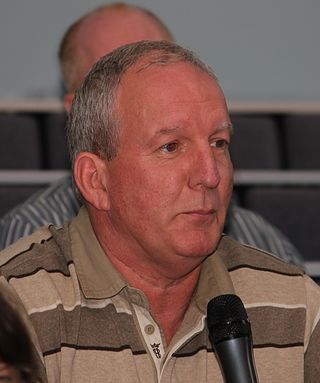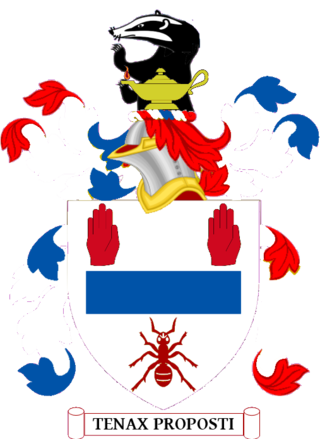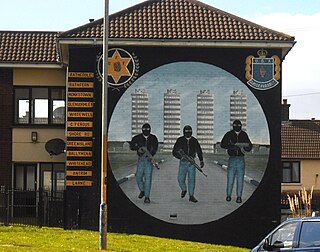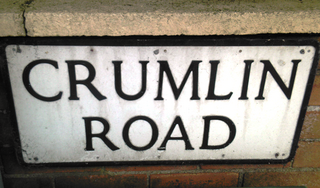
Ian Richard Kyle Paisley Jr is a former Northern Irish unionist politician. A member of the Democratic Unionist Party (DUP), he served as the Member of Parliament (MP) for North Antrim from 2010 to 2024, and was previously a member of the Northern Ireland Assembly for North Antrim from 1998 to 2010. Paisley is the DUP's Spokesperson for Digital, Culture, Media and Sports. He is a son of the DUP's founder Ian Paisley.

James Hugh Allister is a Northern Irish politician and barrister who has served as Member of Parliament (MP) for North Antrim since the 2024 general election. He founded the Traditional Unionist Voice (TUV) in 2007 and has led the party since its formation. Prior to his election to Westminster, Allister was a member of the Legislative Assembly (MLA) for North Antrim, having been first elected in the 2011 Assembly election.

Ballymoney is a town and civil parish in County Antrim, Northern Ireland. It is within the Causeway Coast and Glens Borough Council area. The civil parish of Ballymoney is situated in the historic baronies of Dunluce Upper and Kilconway in County Antrim, as well as the barony of North East Liberties of Coleraine in County Londonderry. It had a population of 11,048 people at the 2021 census.

Robert Storey was a Provisional Irish Republican Army (IRA) volunteer from Belfast, Northern Ireland. Prior to an 18-year conviction for possessing a rifle, he also spent time on remand for a variety of charges and in total served 20 years in prison. He also played a key role in the Maze Prison escape, the biggest prison break in British penal history.

Ballymena Academy is a mixed gender, voluntary grammar school in the market town of Ballymena in County Antrim, Northern Ireland. It was founded in 1828 as a small provincial school for children in the town and surrounding agricultural hinterland.

HM Prison Belfast, also known as Crumlin Road Gaol, is a former prison situated on the Crumlin Road in north Belfast, Northern Ireland. Since 1996 it is the only remaining Victorian era former prison in Northern Ireland. It is colloquially known as the Crum.

Sir Charles Lanyon DL, JP was an English architect of the 19th century. His work is most closely associated with Belfast, Northern Ireland.
The Northern campaign was a series of attacks by the Irish Republican Army (IRA) Northern Command between September 1942 and December 1944 against the security forces in Northern Ireland. The action taken by the Northern Irish and the Irish governments as a result of these attacks shattered the IRA and resulted in the former being free from IRA activity by the end of World War II. In December 1956 the IRA began its Border Campaign which lasted until February 1962.

The A26 is a road in Northern Ireland. It travels in a north–south direction from Coleraine, County Londonderry to Banbridge, County Down.
David Alexander Tweed was a Northern Irish unionist politician, Irish rugby union international and serial child sex offender.

The UDA South East Antrim Brigade was previously one of the six brigades of the Ulster Defence Association (UDA) and are heavily involved in the drug trade. It is claimed they control "100%" of an illegal drugs network in south-east County Antrim, Northern Ireland. A mural in support of the group lists its areas of activity as being Rathcoole, Rathfern, Monkstown, Glengormley and Whitewell, all of which are part of Newtownabbey, as well as Carrickfergus, the Shore Road, Greenisland, Ballymena, Whitehead, Antrim and Larne. A newer mural in the Cloughfern area of Newtownabbey and flags have updated the areas to include Ballycarry, Ballyclare, the rural hinterland of Ballymena called 'Braidside' and despite not being in County Antrim, the town of Newtownards. The Guardian has identified it as "one of the most dangerous factions". The Irish News described the brigade as 'powerful' and at one time being 'the most bloody and murderous gang operating within the paramilitary organisation'. Since 2007 the South East Antrim Brigade has operated independently of the UDA following a fall-out.

Mid and East Antrim is a local government district in Northern Ireland. The district was created on 1 April 2015 by merging the Borough of Ballymena, the Borough of Larne and the Borough of Carrickfergus. The local authority is Mid and East Antrim Borough Council.
This is a timeline of actions by the Irish republican paramilitary groups referred to as the Real Irish Republican Army and New Irish Republican Army. The Real IRA was formed in 1997 by disaffected members of the Provisional IRA. Since July 2012, when Republican Action Against Drugs (RAAD) and other small republican groups merged with it, the group has been called the New IRA; although it continues to call itself simply "the Irish Republican Army".
This is a timeline of actions by the Ulster Volunteer Force (UVF), an Ulster loyalist paramilitary group since 1966. It includes actions carried out by the Red Hand Commando (RHC), a group integrated into the UVF shortly after their formation in 1972. It also includes attacks claimed by the Protestant Action Force (PAF), a covername used by the UVF. Most of these actions took place during the conflict known as "the Troubles" in Northern Ireland.

The dissident Irish republican campaign began at the end of the Troubles, a 30-year political conflict in Northern Ireland. Since the Provisional Irish Republican Army called a ceasefire and ended its campaign in 1997, breakaway groups opposed to the ceasefire and to the peace agreements have continued a low-level armed campaign against the security forces in Northern Ireland. The main paramilitaries involved are the Real IRA, Continuity IRA and formerly Óglaigh na hÉireann. They have targeted the Police Service of Northern Ireland (PSNI) and the British Army in gun and bomb attacks as well as with mortars and rockets. They have also carried out bombings that are meant to cause disruption. However, their campaign has not been as intensive as the Provisional IRA's, and political support for groups such as the Real IRA is "tending towards zero".

The Crumlin Road is a main road in north-west Belfast, Northern Ireland. The road runs from north of Belfast City Centre for about four miles to the outskirts of the city. It also forms part of the longer A52 road which leads out of Belfast to the town of Crumlin. The lower section of the road houses a number of historic buildings, including the city's former law courts and prison, whilst the road encompasses several large housing areas, including Ardoyne, Ballysillan and Ligoniel(from Irish Lag an Aoil, meaning 'hollow of the lime').

Antrim County Council was the authority responsible for local government in County Antrim, Northern Ireland.

County Hall is a municipal facility at Galgorm Road in Ballymena, County Antrim, Northern Ireland. It served as the headquarters of Antrim County Council from 1970 to 1973.

Kofi Balmer is a Northern Irish professional footballer who plays as a centre-back for Scottish Premiership club Motherwell. He has won caps for Northern Ireland up to under-21 level.
















